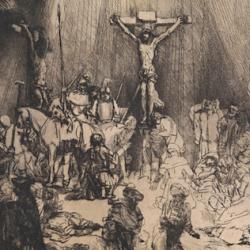The resurrection was a judicial act, the Father’s response to Jesus who “handed himself over to the righteous Judge” (1 Peter 2:23). But what is the verdict? What is the Father saying about Jesus, to Jesus, to us, in the resurrection?
Raymund Schwager (Jesus in the Drama of Salvation) puts it this way: “The action of the Father at Easter is to be understood as a judgment by which he takes up a position in the conflict between the claim of Jesus and the verdict of his opponents.” By raising Jesus, the Father gave a “verdict for his Son and against those who opposed him,” who were “convicted as sinners” (135).
But Schwager reminds us who this Jesus is that the Father approves: He is the Messiah who gave Himself up to death “for his opponents.” He is the Jesus who offered Himself for sinners. And that means by approving Jesus, the Father is also passing judgment in favor of sinners: “the verdict of the heavenly Father is above all a decision for the Son who gave himself up to death for his opponents. It is therefore, when considered more deeply, also a verdict in favor of sinners. The opponents of the kingdom of God, closing themselves off, had the way to salvation once more opened for them by the Son, who allowed himself to be drawn into their darkness and distance from God.” He “got around this hardening of hearts once more, insofar as he allowed himself to be made the victim of their self-condemnation” (135).
Thus, “the judge’s verdict at Easter was . . . not only a retrospective confirmation of the message of Jesus, but it also contained a completely new element, namely, forgiveness for those who had rejected the offer of pure forgiveness itself and persecuted the Son” (136). Schwager is wrong, however, to say that the Father acts differently from the master of the vineyard in Jesus’ parable, who takes vengeance for his son. The Father does once again offer forgiveness, the kingdom is once again proclaimed as a message of grace, but those who reject it again are doomed. For all the value of Schwager’s paradigm, his effort to delete judgment in the usual sense from the gospel story distorts the story.











